CrawlerChunky
In truth, there is barely enough story here to make a film.
Voxitype
Good films always raise compelling questions, whether the format is fiction or documentary fact.
Seraherrera
The movie is wonderful and true, an act of love in all its contradictions and complexity
Tyreece Hulme
One of the best movies of the year! Incredible from the beginning to the end.
tesstan1-110-174685
I was born in Corbin and watched this documentary with my mother who was also born in Corbin. We traveled in the military so I wasn't as aware as I could have been about the history of Corbin. Mom made this documentary more interesting by her memories of the people who were interviewed. It's been many years since I've seen it but from her stories along with the film, I have to admit, Corbin does (and always will have) many many faults. Racism is a big one. There are many elderly people who still talk as if it was OK to talk rudely about others. This film should be shown in schools. Not just Corbin schools. People are PEOPLE. The color of the skin shouldn't matter.
Kevin
The big problem with this documentary is that the director did not pick a typical person that lives in Corbin. He obviously had to do a lot of editing to get the worst of the worst.I know a lot of people in Corbin and this film does not even come close to portraying the people of the town. The movie was interesting to watch as long as you are aware that most of the people of the town are nothing like the few bad apples that the director used for his film. I am sure there are many different opinions in Corbin about the different races just like any community. This film is very prejudice and unfair. Many of the now residents of Corbin came from other areas of the country and know very little about what happened in the early 1900's. A very bias account against a small southern Christian community.
zbrown-2
When I saw this film for the first time my eyes nearly popped out of my head. Here's a town that in the 1990s still had a street named "Nigger Creek Road". Some time around 1919 all the black men were taken from their homes by a white mob and shipped out on trains. Corbin remained an entirely white community from that day forward. This film tears aside the defensive walls of the current residents, to expose the seething racism that still exists in Corbin.The most significant point of the film for me was not the expose of a small town, but the truth that if a place like Corbin can exist and thrive in this country, it must be only one example of a much broader problem. Racism in the United States is still pervasive. And like the citizens of Corbin, we rationalize, we deny, we lie to ourselves in order to avoid the awful truth: that we live in a racially divided and divisive country still. That is the true point of this film, and one that it makes very well.The film also does not neglect to point out that there is still hope. Some of the younger interviewees (though not all) are able to acknowledge the situation and look at it openly. And clearly the filmmakers themselves are also attempting to address the issue. We need more films like this, more attempts like this throughout our society. It's too easy for people to point to events that happened long ago and say, "oh, no one feels that way now. We have advanced so far today." We need more films to expose not only that this is mere wishful thinking, but also the inherent racism that must exist in the person making a statement like that in today's world. We need films that show us who we are today, just as "Trouble Behind" shows the citizens of Corbin who they are; to force us to consider important issues that we may not only not want to consider, but may have constructed elaborate self-deceits to protect us from considering.

